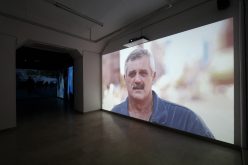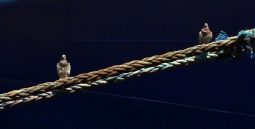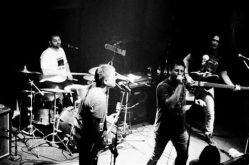The Rijeka 2020 – European Capital of Culture project will be showcased in Belgrade from 14 to 22 March 2019.
The project will present the Kitchen flagship, which has conceived a special art programme delivered through three identity themes: shipbuilding, music and gastronomy, at three locations in Belgrade – the Belgrade Cultural Centre, Grad Cultural Centre and Elektropionir.
The Kitchen is a platform for dealing with the traumatic experiences of contemporary and historical migrations that develop and modify the cultural specifics of global communities and whose programmes encompass various areas of cultural and social activity (music, literature, audio-visual activities, innovative artistic and cultural practices, gastronomy, football).
Rijeka 2020 – European Capital of Culture in Belgrade event schedule
THURSDAY, 14 March
Noon // Belgrade Cultural Centre // Presentation of the Rijeka 2020 – European Capital of Culture project
7 pm // Podroom Gallery // “Moment of Silence“ exhibition by Nadija Mustapić & Toni Meštrović and the Relationship Between Ships and Champagne slide show by Petar Trinajstić
Opening of the “Moment of Silence“ exhibition by Nadija Mustapić & Toni Meštrović
Moment of Silence is a joint effort by Nadija Mustapić and Toni Meštrović, two video artists from Rijeka and Split respectively. It was made during 2012 and 2013 by shooting on-site footage at the 3 May and Brodosplit shipyards and cooperating with the workers themselves. The audio and video material shot at the shipyards in Split and Rijeka were edited into a multichannel installation that will be shown in the gallery area on eight audio and five video channels.
Moment of Silence questions the translation of individual work values into local tradition and production, which directly relates to national or global economies. Behind the topical economic and political subject of shipyard privatisation and the demise of the Croatian shipbuilding tradition lies the socially marginalised and intensive labour to which the workers are subjected during the manufacturing process. This places the people, their movements, the shaping of space, their actions and gestures at the forefront. The aim of the project is to draw attention to specific skills, individual efforts and work processes that comprise a whole tradition, yet remain overlooked in the context of the wider public debate on the future of shipbuilding in the region, which has been severely jeopardised at the moment. The red thread of the project alluded to in its name denotes such topics as the frailty of identity, existential and economic uncertainty and the post-transitional desolation wreaked by the imposed privatisation of social resources as a reflection of an issue that transcends local boundaries.

Slide Show – The Relationship Between Ships and Champagne – Petar Trinajstić
A slide show of photographs of the golden age of Rijeka’s industry taken by Petar Trinajstić, one of the most productive photo-chroniclers in Rijeka who has spent his entire working life at the 3 May shipyard. By capturing ship manufacturing and launches, he penetrates below the surface of what is seen with his photo chronicles, selection of motifs, camera angles, exposure of the central theme and an uncanny ability to choose the perfect moment, as if he were an inspired painter. Trinajstić’s photos seamlessly transition from mere documentation to memories and visions. Sometimes he embeds commentary (humorous, wistful, sarcastic) or hints of another similar previous interpretation of the same space.

MONDAY, 18 March
7 pm // Grad Cultural Centre// Delicacy Monday: Dinner with the Artist
8 pm // Grad Cultural Centre // “Take an Artwork Home” interactive exhibition (18 -21 March), Cesare Pietroiusti
Delicacy Monday: Dinner with the Artist
The international visual concept artist Tomislav Brajnović, in cooperation with the musician Igor Anjoli, invites the people of Belgrade to Rijeka with “Cod stew” or “Bora wind-dried sausages in sauerkraut”, which are typical working-class dishes from the coastal region that will be prepared and served in an attempt to break away from artistic pretension and formality by making direct contact with the audience – that is friends, old and new.
Tomislav Brajnović has won a plethora of awards and prizes for his works of art. In 2007, he founded the project gallery Studio Golo Brdo, which he has been active ever since. The oeuvre of this uncompromising artist has always provided socially aware commentary on the contemporary status quo. He will recreate his “Dinner with the Artist” concept for the audience in Belgrade. Fret not, it’s not conceptual – Brajnović and Anjoli will literally be cooking.
“Take an Artwork Home” exhibition
Transitional possession is the work of the Italian concept artist Cesarea Pietroiusti, which is produced by the SIZ Gallery in Rijeka. He has made 500 artworks using the techniques of INA Delta 5 oil painting and the rust of the 3 May shipyard on paper, which visitors and art lovers will be able to take home with them for free. The artworks are unique, numbered and signed and their possession depends on conditions set by the artist himself.
Cesare Pietroiusti was born in Rome in 1955. He is the co-founder of the artist-run space “Jartrakor” in Rome, as well as the magazine “Rivista di Psicologia dell’Arte” (1979-1984). He is also one of the coordinators of the “Oreste” project (1997-2001). He was the co-creator of the “Nomads & Residents” programme in New York. He taught and ran an art lab at the IUAV University of Architecture in Venice. He has developed numerous platforms and art communities for alternative art production and knowledge sharing.
WEDNESDAY, 20 March
7 pm // Grad Cultural Centre// Movie programme, panel and listening party
Films: Tito in Kraljevica, The Years of Rust, Spectre
Panel: Andrej Korovljev and Ivan Salatić
Ri-Rock listening party – DJ LIČO
When one “does not have to live, but has to sail”, then ships also have to be built in the Adriatic. By showing the films “Tito in Kraljevica” by the Belgrade- and Rijeka-based director Nikola Lorencin, “The Years of Rust” by Andrej Korovljev and “Spectre” by Ibro Hasanović, along with an accompanying discussion with the authors Andrej Korovljev and Ivan Salatić at the Grad Cultural Centre, we will tackle the burning topic of abandoning shipbuilding – the most important branch of the regional economy that has been woven into the history of Mediterranean societies. With this programme, we will try to explain what caused the shipbuilding crisis and how it affected the economic and class relationships in our societies.
Nikola Lorencin, Tito in Kraljevica – 1975 Duration: 16 minutes, Film 16mm / colour / sound. Director: Nikola Lorencin, camera: Ervin Debeuc, contributors: Vlado Kauzlarić, Josip Brnčić, Ivo Laurenčić, Petar Aranđelović, Dušan Alekši, Dajana Bauman, Viktor Penezić, Dario Ottaviani and Mihael Sobolovski. Through conversations with the workers and those who met Tito while he worked at the shipyard, this documentary on Tito’s shipyard in Kraljevica near Rijeka clearly shows history repeating itself from a present perspective. It discusses the capitalist shipbuilding crisis of the late 1920s, the bankruptcy of shipyards, strikes and the revolutionary struggle of the unions.
Andrej Korovljev, The Years of Rust – 2000 Duration: 36 minutes – Documentary on the abysmal working conditions at the Uljanik shipyard in Pula and the unscrupulous exploitation of workers under the guise of privatisation. A story about people who spent their entire working lives behind the walls of the Uljanik shipyard in Pula doing the hardest and most dangerous job in shipbuilding – applying anti-corrosion coating. The dust, rust, toxic fumes, subhuman working conditions and no days off slowly transformed these people into jaded working machines. Shrouded under the guise of privatisation, their unscrupulous exploitation left them completely bereft of pride and dignity.
Ibro Hasanović, Spectre – 2013 Duration: 7 minutes – An experimental film about the relationship between industrialisation and modernity told through the story of the “spectre” of Tito’s abandoned yacht Galeb, which is located in Rijeka.
The “And the Ships Keep On Sailing“ panel discussion with Andrej Korovljev and Ivan Salatić
The role of art and film in the process of deconstructing the ideological paradigms of the crony capitalist model prevalent in the region, as well as the chronicles of endless transitional privatisation processes in the former Yugoslav countries, will be discussed by Andrej Korovljev and Ivan Salatić, the director of the well-received film You Have the Night, which deals with the effects of the devastating privatisation economy that has led to the demise of erstwhile industrial giants (such as shipyards), the consequence of which is the deplorable increase in poverty in the societies of the Adriatic region.
Ri Rock Listening Party – DJ Vanja Kauzlarić Ličo
The Ri Rock Festival is celebrating its 40th anniversary this year. It is the oldest music and cultural event of its kind in Croatia and has been traditionally held in Rijeka since 1979. The eponymous Ri Rock association was founded in 2006. Through its well-known cultural and social activities, events, festivals, music workshops, projects and regular programmes, it provides a much-needed alternative to consumerist culture and strives to satisfy the needs and interests of young people by offering a different attitude and path, allowing them to leave a mark on society, enhancing the scene and encouraging their inclusion in urban musical culture at a local and international level.
THURSDAY, 21 March
5-6 pm // Belgrade Cultural Centre – Podroom Gallery// Guided tour of the Moment of Silence exhibition
9 pm // Elektropionir // Contact conference/festival and concert performance for fans – FIT (RI)
Contact Conference/Festival and Concert Performance for Fans – FIT (RI)
This time it was trauma, as well as the dragging normalisation of regional relations, that was instrumental in making the band Fit a symbol of the irrational rejection of the indissoluble cultural ties between the Yugoslav peoples in the turbulent 90s. The band that expanded its fanbase in the mid- and late 80s with catchy pop tunes still remains one of the most successful imports of the Rijeka scene in the regional market. By not being afraid to be labelled “commercial”, which was a much-maligned epithet among second- and third-wave punk and alternative rock bands from Rijeka at the time, Fit paved its way into the Yugoslav market with a brand of pop emphasised by a tight guitar sound and solid singalong lyrics. The band members were lyricist Miro Tešević, songwriter Zorko Opačić, singer Davor Lukas-Bajo and drummer Dean Benzia. Unlike many of their generational counterparts, Fit released two albums during that period – “Uz Rijeku” (“With Rijeka” – 1988) and “Daj mi ruku” (“Give Me Your Hand” – 1989), which contained fan favourites such as “Mačka (“Cat”) and “Rijeka”, as well as “Zvoni telefon” (“Hanging on the Telephone”) and “Zaboravit ću sve” (I’ll Forget Everything”). The album “Uz Rijeku” was produced by Mladen Mladenović, the frontman of the cult band Ekaterina Velika, in which he also played guitar along with Zvonko Đukić-Đule, the founder of the very popular Belgrade band Van Gogh.

FRIDAY, 22 March
11 pm // Grad Cultural Centre // Mile Loves Disco
Mile Loves Disco is a playlist, a series of parties – some might even dare call it a brand. The “guilty pleasure” of Elektrana’s favourite Mile Hund, a list of underground disco hits from the late 70s and early 80s. Prompted by the excellent cooperation with Mr. Brown Sugar, it took on a life of its own in 2011 at Club Discordia in Rijeka as a spin-off of the two-year Mishu Mitsubishu disco-funk parties.


